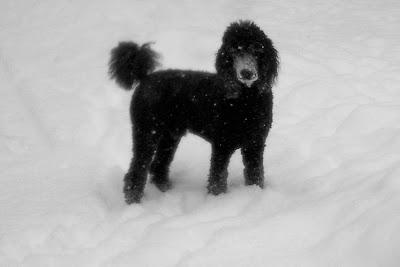 Most dogs love to play in the snow. When it is very cold outside, like it is here in northeast Ohio, make sure that your pet's are safe. Check the bottom of their feet for ice balls that can be a discomfort to them. Don't allow them to stay outside to long in the extreme cold. One thing that is very dangerous to both dogs and cats is antifreeze. Did you know that every year, by some estimates, about 10,000 dogs and cats are victims of accidental poisoning by automobile antifreeze. A pet does not have to drink a lot of antifreeze to be poisoned. Most brands of commercial antifreeze consist of 95 percent ethylene glycol, an extremely toxic chemical. Even a few licks of this sweet-tasting liquid can be fatal to a dog or cat. Some symptoms are much like alcohol intoxication, they may appear to be drunk like staggering, lack of coordination, and disorientation along with vomiting. Dogs and cats may vomit due to the irritating effects of ethylene glycol on the stomach. They drink and urinate excessively and may be depressed and wobbly. The increased thirst is due to stimulation of the thirst centers of the brain. Pets may seem on the road to recovery twelve hours later as the ethylene glycol is metabolized by their liver and kidneys. One or two days later the patient suddenly becomes much worse. They become depressed, weak, and dehydrated. They may develop diarrhea, mouth ulcers, rapid breathing and seizures. Their kidneys are often painful and swollen. The animal may appear listless and depressed. Because early signs of antifreeze poisoning often mimic signs of other illness, neither you or your veterinarian may suspect antifreeze poisoning until it is too late. If your pet shows any signs of these symptoms consult your veterinarian right away.
Most dogs love to play in the snow. When it is very cold outside, like it is here in northeast Ohio, make sure that your pet's are safe. Check the bottom of their feet for ice balls that can be a discomfort to them. Don't allow them to stay outside to long in the extreme cold. One thing that is very dangerous to both dogs and cats is antifreeze. Did you know that every year, by some estimates, about 10,000 dogs and cats are victims of accidental poisoning by automobile antifreeze. A pet does not have to drink a lot of antifreeze to be poisoned. Most brands of commercial antifreeze consist of 95 percent ethylene glycol, an extremely toxic chemical. Even a few licks of this sweet-tasting liquid can be fatal to a dog or cat. Some symptoms are much like alcohol intoxication, they may appear to be drunk like staggering, lack of coordination, and disorientation along with vomiting. Dogs and cats may vomit due to the irritating effects of ethylene glycol on the stomach. They drink and urinate excessively and may be depressed and wobbly. The increased thirst is due to stimulation of the thirst centers of the brain. Pets may seem on the road to recovery twelve hours later as the ethylene glycol is metabolized by their liver and kidneys. One or two days later the patient suddenly becomes much worse. They become depressed, weak, and dehydrated. They may develop diarrhea, mouth ulcers, rapid breathing and seizures. Their kidneys are often painful and swollen. The animal may appear listless and depressed. Because early signs of antifreeze poisoning often mimic signs of other illness, neither you or your veterinarian may suspect antifreeze poisoning until it is too late. If your pet shows any signs of these symptoms consult your veterinarian right away.Thursday, December 23, 2010
Winter can be dangerous for pets
 Most dogs love to play in the snow. When it is very cold outside, like it is here in northeast Ohio, make sure that your pet's are safe. Check the bottom of their feet for ice balls that can be a discomfort to them. Don't allow them to stay outside to long in the extreme cold. One thing that is very dangerous to both dogs and cats is antifreeze. Did you know that every year, by some estimates, about 10,000 dogs and cats are victims of accidental poisoning by automobile antifreeze. A pet does not have to drink a lot of antifreeze to be poisoned. Most brands of commercial antifreeze consist of 95 percent ethylene glycol, an extremely toxic chemical. Even a few licks of this sweet-tasting liquid can be fatal to a dog or cat. Some symptoms are much like alcohol intoxication, they may appear to be drunk like staggering, lack of coordination, and disorientation along with vomiting. Dogs and cats may vomit due to the irritating effects of ethylene glycol on the stomach. They drink and urinate excessively and may be depressed and wobbly. The increased thirst is due to stimulation of the thirst centers of the brain. Pets may seem on the road to recovery twelve hours later as the ethylene glycol is metabolized by their liver and kidneys. One or two days later the patient suddenly becomes much worse. They become depressed, weak, and dehydrated. They may develop diarrhea, mouth ulcers, rapid breathing and seizures. Their kidneys are often painful and swollen. The animal may appear listless and depressed. Because early signs of antifreeze poisoning often mimic signs of other illness, neither you or your veterinarian may suspect antifreeze poisoning until it is too late. If your pet shows any signs of these symptoms consult your veterinarian right away.
Most dogs love to play in the snow. When it is very cold outside, like it is here in northeast Ohio, make sure that your pet's are safe. Check the bottom of their feet for ice balls that can be a discomfort to them. Don't allow them to stay outside to long in the extreme cold. One thing that is very dangerous to both dogs and cats is antifreeze. Did you know that every year, by some estimates, about 10,000 dogs and cats are victims of accidental poisoning by automobile antifreeze. A pet does not have to drink a lot of antifreeze to be poisoned. Most brands of commercial antifreeze consist of 95 percent ethylene glycol, an extremely toxic chemical. Even a few licks of this sweet-tasting liquid can be fatal to a dog or cat. Some symptoms are much like alcohol intoxication, they may appear to be drunk like staggering, lack of coordination, and disorientation along with vomiting. Dogs and cats may vomit due to the irritating effects of ethylene glycol on the stomach. They drink and urinate excessively and may be depressed and wobbly. The increased thirst is due to stimulation of the thirst centers of the brain. Pets may seem on the road to recovery twelve hours later as the ethylene glycol is metabolized by their liver and kidneys. One or two days later the patient suddenly becomes much worse. They become depressed, weak, and dehydrated. They may develop diarrhea, mouth ulcers, rapid breathing and seizures. Their kidneys are often painful and swollen. The animal may appear listless and depressed. Because early signs of antifreeze poisoning often mimic signs of other illness, neither you or your veterinarian may suspect antifreeze poisoning until it is too late. If your pet shows any signs of these symptoms consult your veterinarian right away.
Subscribe to:
Post Comments (Atom)









1 comment:
Thank you for posting this. Alot of pet owners are not aware of the dangers of anti-freeze and its something that more people should know about.
Post a Comment